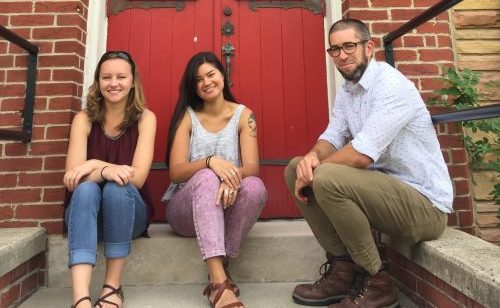
Tori Bateman, Monica McFadden, and Nathan Hosler of the Office of Peacebuilding and Policy.
By Nathan Hosler, director of the Office of Peacebuilding and Policy
“I looked, and there was a great multitude that no one could count, from every nation, from all tribes and peoples and languages, standing before the throne and before the Lamb, robed in white, with palm branches in their hands” (Revelation 7:9).
In 2007, the Church of the Brethren Annual Conference delegate body adopted the “Separate No More” statement, which calls us to become the multicultural, multiracial, multinational, and multilingual church envisioned in Revelation 7:9. The vision in scripture and the one to which we committed is greater than a photogenic diverse hymn sing. It is a vision that recognizes how, as we draw closer to God, we also draw closer to one another. We become more compassionate in relationships as we see one another the way God sees us. In an effort to better express this, we changed the names of two core ministry areas.
Discipleship Ministries (formerly Congregational Life Ministries) reminds us that our faith journey is not defined by our congregational affiliation, but by our spiritual journey—both individually and collectively. This also means that having a right relationship with God is shaped and shared through building right relationships with one another. The Office of Peacebuilding and Policy (formerly Public Witness) as a ministry in Washington, D.C., connects our faith with our national identity. To stand together, bridging the divides of the world, we are peacebuilders in the spirit of Christ.
The “Separate No More” statement gave us the following challenge: “Congregations become informed about the conditions of life for ethnic and racial minorities within their neighborhoods and their congregations, so that when inequities are uncovered, they can make strong commitments of time and financial resources to local organizations working on these issues.”
In the New Testament, one Greek word used to describe the body of Christ is “dikaios,” which is translated righteousness but also justice. Since both can be used in English, we can call this work either racial justice or racial righteousness; however, scripture does not separate the two. By faith, we are called to be discipled within our church and, as a result, to work for change in systems, structures, and habits of racism in society. Not assuming that we already possess righteousness, we seek to have right relationships and to address problems in the world. The work to heal the wounds of racism is both internal and external and has the goals of justice and righteousness. To do this work means being shaped and formed by the process of discipleship.
Many congregations have been doing this work in their communities. Several members of the Mission and Ministry Board and staff have taken the Sankofa Journey. Young people attend Christian Citizenship Seminar in Washington, D.C., and New York to connect their faith with contemporary social justice work. Discipleship Ministries hosts a pre-Annual Conference training with the goal of exploring how our faith can shape our understanding of racialized hierarchies. Intercultural Ministries provide support to individuals and congregations engaged in ministry.
To increase our awareness of how government policy creates racialized experiences and discrepancies, we are testing a new Brethren Volunteer Service position in the Office of Peacebuilding and Policy through a partnership with Intercultural Ministries and the Global Food Initiative. Monica McFadden, who served in our office last summer as a Ministry Summer Service intern, recently accepted the call to serve in this role.
Thank you for partnering in this work through your support of the Church of the Brethren. By working in your community and supporting these denominational ministries prayerfully and financially, this work can be expanded in the years ahead so that the church can better live into God’s vision of diversity. Through being faithful disciples—growing in righteousness and justice—all of us are engaging in the vital work of healing in our churches and communities.
Learn more about the work of the Office of Peacebuilding and Policy at www.brethren.org/peacebuilding or support it today at www.brethren.org/give.

